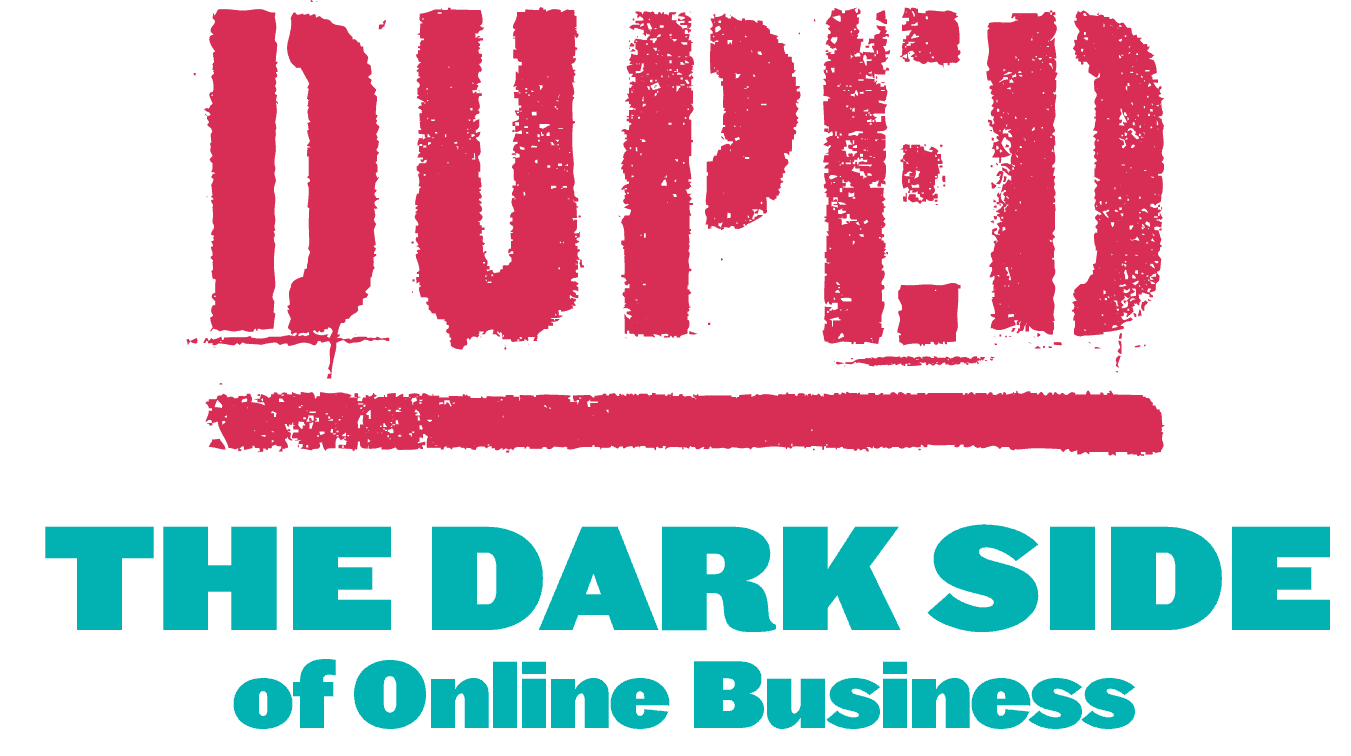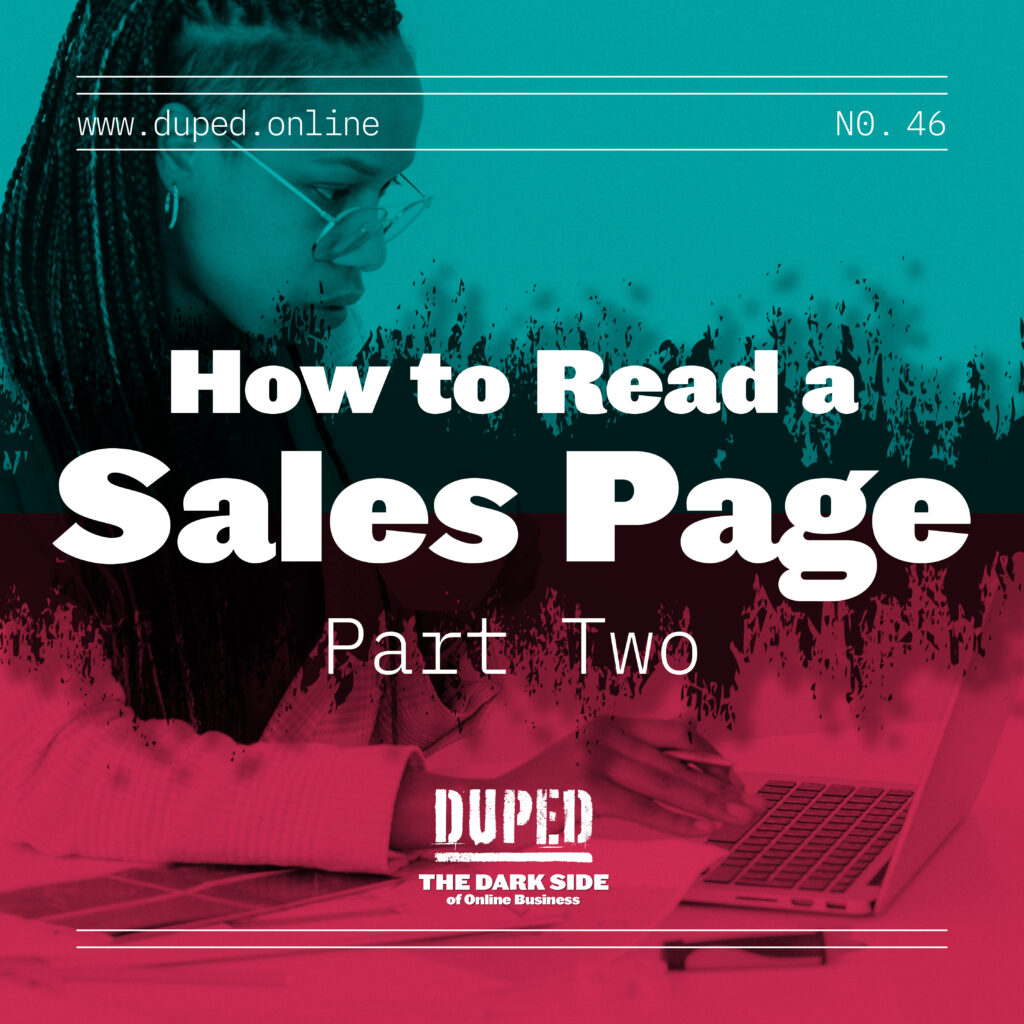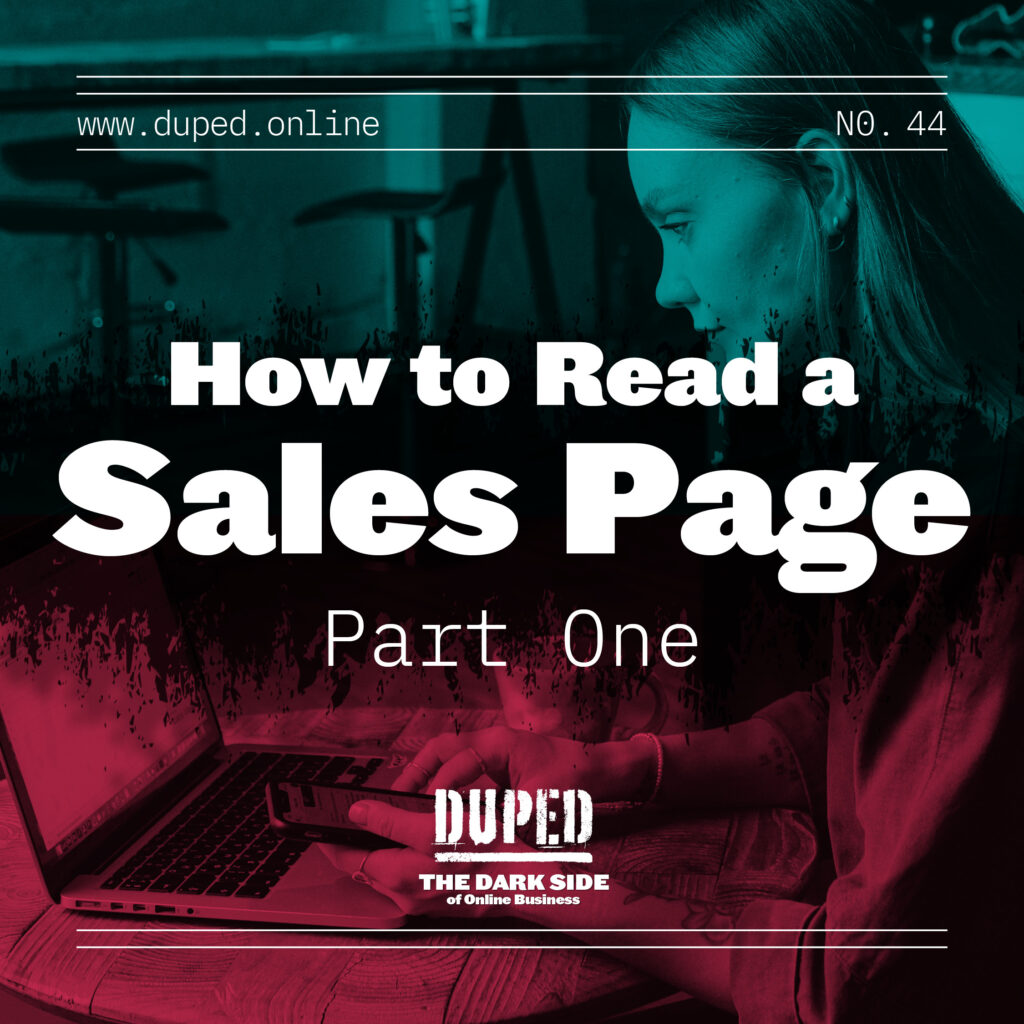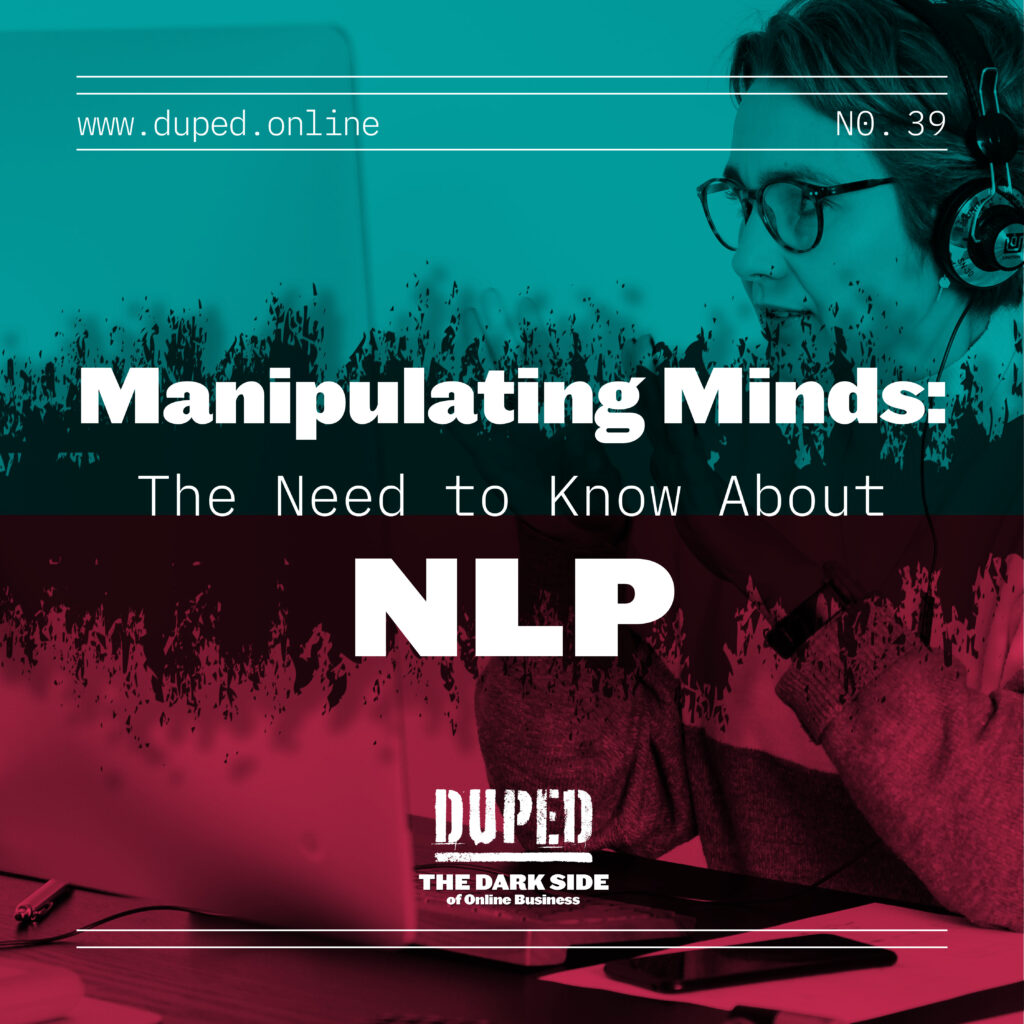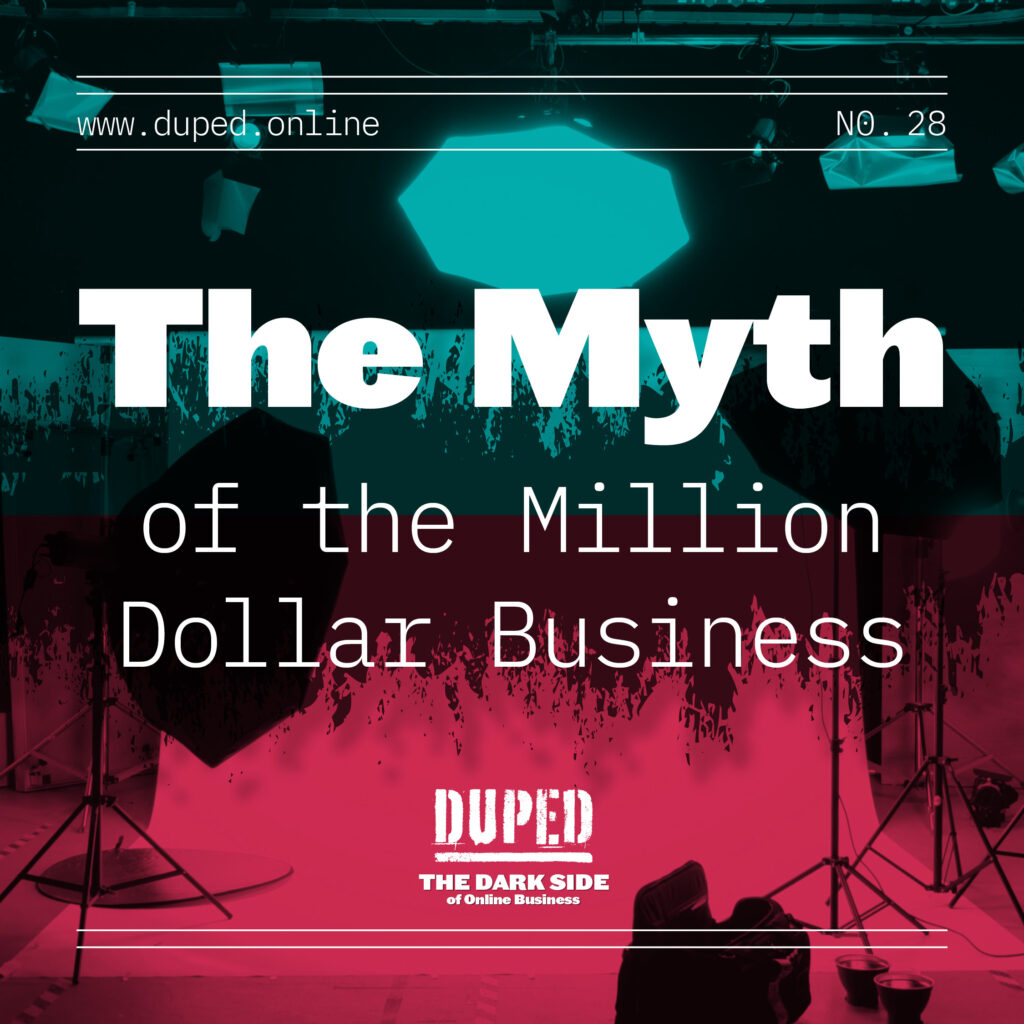
The Myth of the Million Dollar Business
Talk about making a million dollars with your business inescapable. But how realistic is it really? In this episode, we’re looking at the myth of the million-dollar business, the data behind it, and if these promises are scamming us.
Are you ready? Because this week, we’re going to explore something so familiar in online business, but it’s incredibly scammy. We’re talking about the myth of the million-dollar business.

We fully expect some hate mail on this one. Still, when we’re using the word myth here very intentionally, as in online business, talk of the 7-figure business is everywhere, and it’s something we’re all supposed to aspire to, or we’re playing small.
It’s important to note that we’re not hating on anyone with a legit million-dollar business, but rather the aspirational BS marketing that goes around making 7-figures.
But first, if you want to talk more about the myth of the million-dollar business, join the Duped Patreon for only $7 a month.
Why We Can’t Escape the Million Dollar Mark as a Measure of Success
When I started in the online business world, it was 6 figures that were all the rage; then, it quickly became 7-figures or a million dollars.
A million dollars sounds like more money than most of us can imagine. And in our culture, millionaires are seen as superior beings.
This is where online business is a mirror image of the world when operating in a capitalist economic system. Success is defined by how much money we make and what we have.
The funny part to me is that so many of us don’t start a business with this in mind, but thanks to the way it’s revered in online business, it can mess with your head. That’s exactly why we want to break down the numbers!
Millionaire Math: The Odds Are Against Us
Before we look at actual numbers around having a million-dollar business or being a millionaire, we must distinguish between those two things.
Having a business making a million dollars in business doesn’t make you a millionaire. In fact, many online business owners are pulling in over 7 figures and making way less than 6-figures a year. So by that measure, that million-dollar mark is a poor indicator of personal financial success or stability.
There are a lot of million-dollar business owners who are broke because their overhead is so high.
There are so many facets to this conversation and the numbers, but let’s look at specific numbers of how many businesses in the US (as that’s the most accessible data) make over a million dollars a year.
2018 data reported by Small Business Genius is that 9% of small businesses in the US made more than $1 million in annual revenue. Fundera data reported that 86.3% of US-based small business owners make less than $100k annually.
Plus, as we’ve chatted about here on the show before, the more money you have, the more likely you are to be successful as an entrepreneur.
Research from Bell et al (2018) and Marinoni & Voorheis (2019) show how “gains from an entrepreneurial activity are concentrated in the top of income distribution, implying a broader picture of unequal chances of entrepreneurial success”.
Then, there’s the stark reality that the playing field is far from level:
88% of women-owned businesses earn less than $100k and only 4.2% earn over a million.
A 2020 report from the US-based Office of Advocacy reported that the average non-employer had a revenue of $47,000. However, that number dropped to $27k for women, $22k for Black business owners, and $36k for Hispanics.
The playing field is not level in news that should shock no one. That’s why the “I did it and you can too” story often attached to these revenue levels is flawed.
If you zoom out and look at how many people become millionaires in the US, it’s further confirmation that maybe this is not nearly as easy as the dream we’re being sold.
Spectrem Group’s 2021 Market Insights Report found that there were 9.8 million individuals with a net worth between $1 million and $5 million in the US. That’s 3.5% of the total population.
What’s Really Happening Here?
Looking at the myth of the million-dollar business, we could have an entirely different podcast focused on that topic.
But let’s do a quick rundown on what’s going on. First, in North America, at least, we’ve been sold the dream that we can be or do anything and that if we work hard enough, we can have it.
From a very young age, we’re conditioned to think that anyone, including us, can acquire wealth. But as we discussed a few minutes ago, that’s not the case.
What’s interesting is how this keeps us on the hook, and we think that maybe we’ll be the one with the winning lottery ticket. That magical thinking is drilled into us repeatedly, and we bring that into assessing if we, too, can be the one with a business that will be one of the 7-figure success stories.
As discussed in the last episode, when you combine our conditioning with the stresses of running a business and living in this current landscape, it’s no wonder we want this to be true. We’re vulnerable to these promises, even if we know it’s not likely to happen.
You may be wondering what the alternative is, and we don’t want anyone to think that you can’t have a successful business and make a solid living. But instead, we want to encourage you to skip this BS and define your goals. Ones that work for you and are not tethered to this magical thinking or mythical level of success.
The Million Dollar Myth: How Not to Buy into the Bullshit
Remember, this season, we’re focused on online business scams, and while the million-dollar myth isn’t what you may traditionally think of as a scam, it’s definitely in the scam zone as we’re being sold a bill of goods.
With that, here’s what to watch for to not fall into this trap:
Income Claim Marketing: Anyone using income claims to tell you that they can teach you to make money the way they do is asking for you to believe. So many times, that claim is baseless and designed to tap into your desire to make more money. (When really, they’re the only ones getting rich here.)
I Did It and You Can Too: People pushing big money dreams love to tell us their stories about how they did it, and we can too. The only problem is that the data here doesn’t back it up. Just because they did, doesn’t mean we can too. It’s a lie, and that rags-to-riches story is designed to short-circuit your brain so you’re willing to buy emotionally.
Lifestyle Marketing: A big part of the trappings of the million-dollar business is showing us how our lives could be with fancy houses, luxury travel, and a first-class life. They know that so many of us aspire to these things, and they use them to signal that they’re successful. The only problem is much of it is an illusion. It’s rented, borrowed, or requires them to carry a lot of debt. And if it’s not, you need to ask what they did to earn that money because so much of it was scammed by people who are broken and bankrupt.
Stop Buying Into the BS: Finally, do the work to opt out of this BS. Figure out what you want. Stop worrying about artificial revenue goals, and nail down how much money you need to live. Then figure out how much is enough for you to live the life you want. Most of us don’t need or want any of this crap, yet, it makes us feel like shit on the regular.
Links for This Episode
- Small Business Genius Statistics
- Fundera Small Business Revenue Statistics: Annual Sales and Earnings
- Duped: The Entrepreneurial Industrial Complex
- Who Becomes an Inventor in America? The Importance of Exposure to Innovation
- Who Gains from Creative Destruction? Evidence from High-Quality Entrepreneurship in the United States
- Amex State of Women-Owned Business Report 2019
- Small Business Annual Sales — How Much Money Do They Make?
- Spectrem Group’s 2021 Market Insights Report
Join the

Patreon

for only $7/month and get a
monthly bonus episode,
behind-the-scenes content
and more.
